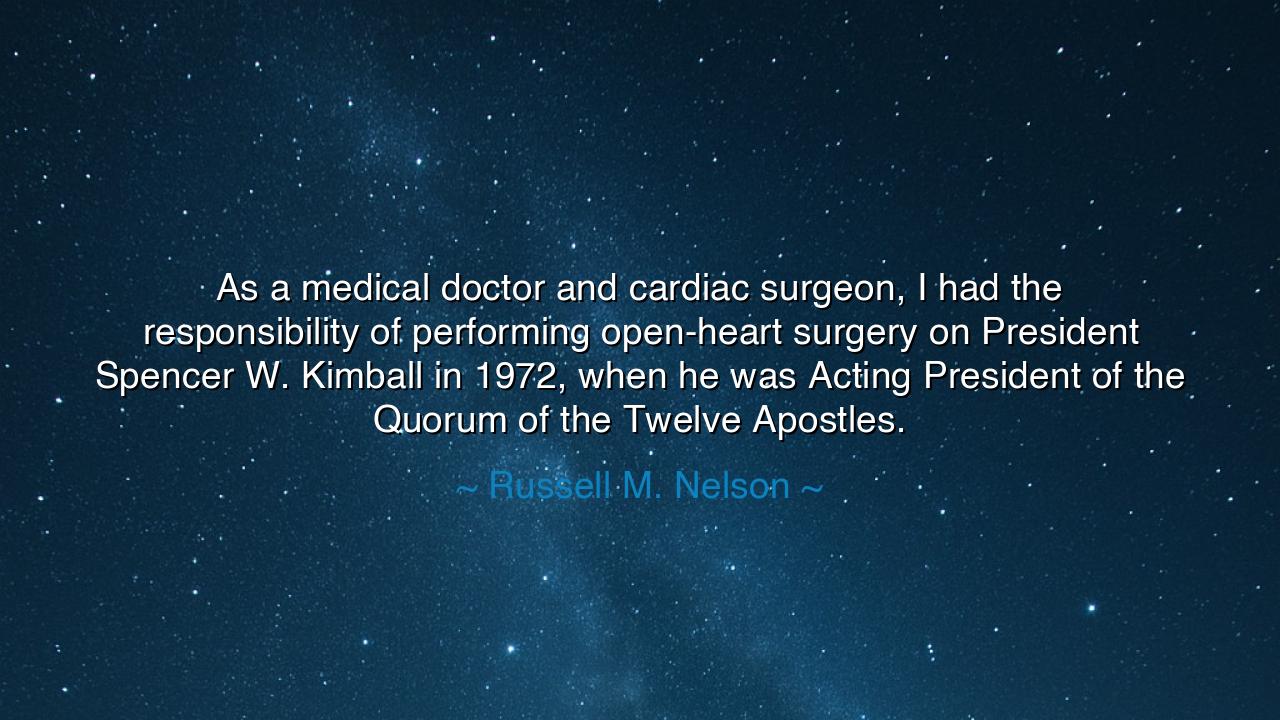
As a medical doctor and cardiac surgeon, I had the responsibility
As a medical doctor and cardiac surgeon, I had the responsibility of performing open-heart surgery on President Spencer W. Kimball in 1972, when he was Acting President of the Quorum of the Twelve Apostles.






"As a medical doctor and cardiac surgeon, I had the responsibility of performing open-heart surgery on President Spencer W. Kimball in 1972, when he was Acting President of the Quorum of the Twelve Apostles." These words from Russell M. Nelson are laden with profound significance, both in terms of duty and responsibility. As a medical professional, Nelson was entrusted with the care of one of the most revered religious figures of his time, and in performing open-heart surgery on President Spencer W. Kimball, Nelson exemplified the rare intersection of healing and leadership. His words reflect the weight of the task—a task that was not just a medical procedure, but a moment of profound trust, where the life of a spiritual leader was placed in the hands of a healer, whose skill and wisdom could shape the future of a community.
In the ancient world, the relationship between healing and leadership was a sacred one. The Egyptians, known for their advancements in medicine, often saw the healer as a figure of divine responsibility. The famous Imhotep, who was both a physician and a priest, was not just a healer of bodies, but also a guide to the soul. His medical knowledge was intertwined with his spiritual insight, and the healing process was as much about the patient’s spiritual well-being as their physical state. In the same way, Nelson’s surgery on President Kimball was not just an act of medicine but also an act of profound responsibility—a moment where health and spiritual leadership were deeply intertwined.
Consider the biblical figure of Luke, known as a physician and a companion of the Apostle Paul. Luke's work in the medical field was esteemed not only for his skills but for his commitment to healing both physical ailments and spiritual afflictions. In the Gospel of Luke, he writes not just about miracles of healing, but about the compassion of Jesus and his care for the whole person—body, mind, and spirit. Luke, as a healer, recognized that his role was one of service—a duty not just to treat the body, but to serve the soul of the individual. In the same vein, Nelson’s role as both a surgeon and a member of the Latter-day Saint faith shows the profound intersection of spiritual care and physical healing.
Nelson's story also underscores the gravity of being a healer, especially when entrusted with the care of those who hold great influence and responsibility. When we reflect on the role of a healer in ancient civilizations, we find that many were revered not only for their knowledge but for their ability to guide individuals in moments of crisis. The ancient Greeks held Asclepius, the god of healing, in high regard, understanding that healing was not just about curing disease, but about restoring balance to the whole person. Similarly, Nelson’s task was not just to perform a surgery, but to ensure that a man of great spiritual influence could continue his work, to provide care in a way that honored both life and the sacred trust placed in him.
In a modern context, Nelson’s experience brings to light the role that trust and responsibility play in the medical profession. It is not just the technical skill of the surgeon that matters, but the humility, compassion, and understanding of the person entrusted with the task. Much like the ancient healers, today’s doctors are not merely technicians; they are guardians of life, holding the responsibility of both science and humanity in their hands. Nelson’s words remind us that true healing is not just about fixing what is broken, but about ensuring that the patient’s life continues in a way that respects the larger purpose of their role in the world.
The lesson here is that healing is a sacred responsibility, one that requires both skill and integrity. Nelson’s work as a surgeon was not just an act of physical healing; it was an act of service to a man who held a position of great spiritual leadership. When we are entrusted with the care of others, whether in a medical, emotional, or spiritual context, we must approach that task with the utmost respect and humility. Our actions should not be taken lightly, for they have the potential to affect not just the individual, but the community they serve.
As we reflect on Nelson’s story, let us be inspired to live our own lives with a sense of duty and responsibility to those around us. Whether in our personal relationships or in our professional work, we should approach every challenge with integrity and a commitment to serve with both compassion and wisdom. Let us remember that every task, no matter how small or large, carries with it the potential to heal, to restore, and to serve the greater good. As Nelson exemplified, it is through service—whether in the operating room, in our communities, or in our everyday lives—that we truly make a difference in the world around us.






AAdministratorAdministrator
Welcome, honored guests. Please leave a comment, we will respond soon